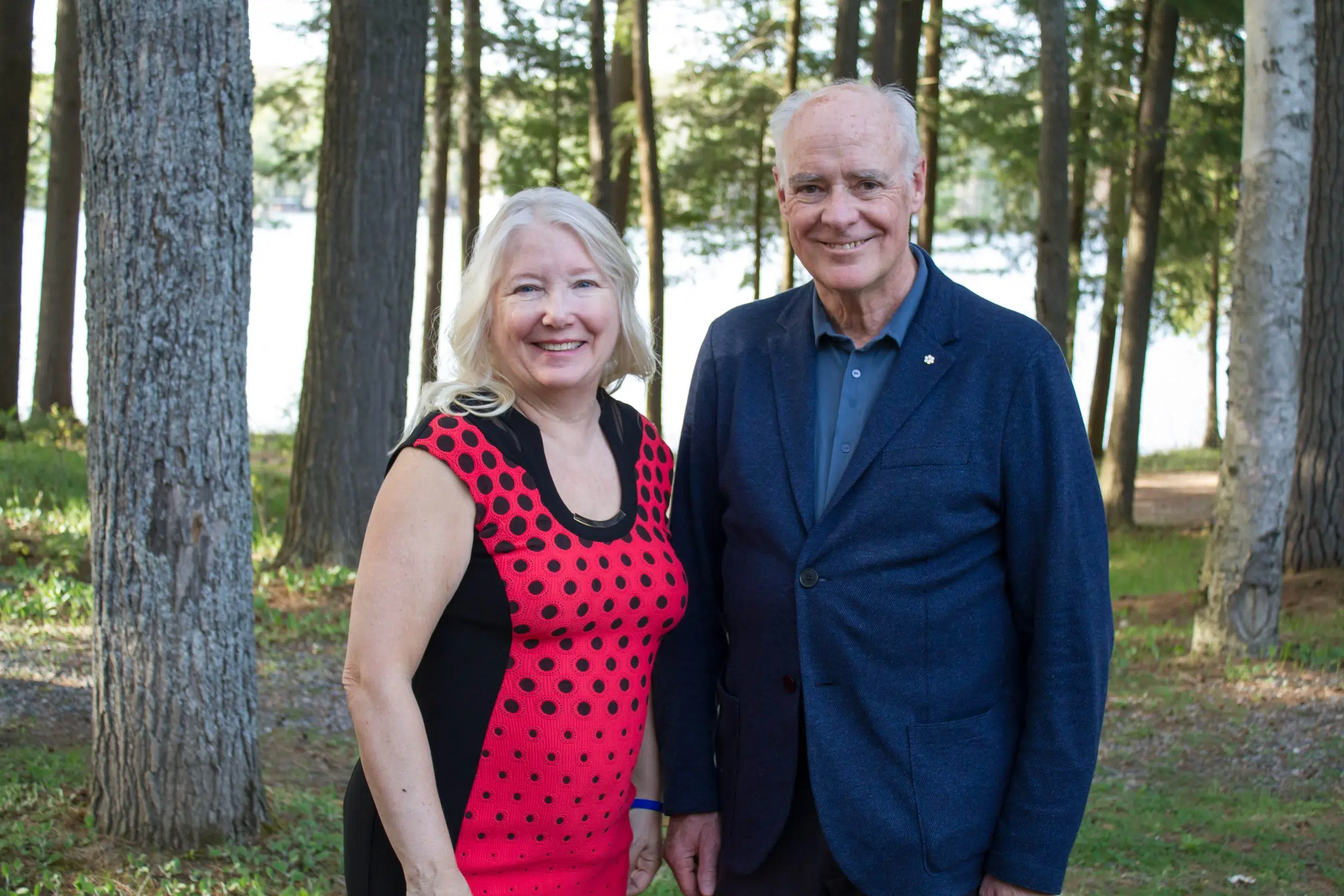Muskoka and Canadian businesses can recover from the pandemic but only if there’s a concerted plan for the short and long-term futures.
That’s the message relayed by the Honourable Perrin Beatty, President of the Canadian Chamber of Commerce, during his keynote address to the Muskoka Lakes Chamber of Commerce Annual Meeting on May 12 at the Sherwood Inn.
Beatty said the support the Muskoka Lakes Chamber showed during the pandemic proves conclusively that chambers are important during the good times, but essential during the tough times.
And the times continue to be tough for the country’s businesses.
Whether it’s the lingering effects of the pandemic, inflation, trickle-down influences of the war in Ukraine or climate disaster, we are still awash in uncertainty, he said.
As challenging as it is though, Beatty says we can learn important lessons and grasp unique opportunities if we pay attention to vital business needs.
Two issues of immediate concern across the country and in Muskoka are recruiting and retaining people with required skills, and supply chain disruptions
Beatty says Canada’s declining birth rate and an aging workforce have led to a labor crunch.
“In 2019 we had roughly 1 million jobs going unfilled,” he said. “Earlier this year we recouped all the jobs lost during the pandemic and we still have nearly one million jobs left open – with little chance of filling them within a reasonable time.”
“For an economy like Muskoka, this issue is compounded,” he continued. “Not only are you a small rural community, but your economic cycle is heavily seasonal, making it doubly-hard to attract and keep talent.”

The situation forces many workers to leave places like Muskoka and head toward urban centers and their higher wages.
Beatty says the structural workforce gap is a core economic problem that policymakers of all political stripes have been sleepwalking through for far too long.
“We’ve heard a lot about creating jobs,” he said. “We’ve heard very little about creating a sustainable workforce.”
Right now, Canada urgently needs a strategy that does a better job of employing the skills of women, minorities, persons with disabilities and older workers and indigenous Canadians, as well as new approaches to immigration, training, re-skilling, up-skilling, and talent pipeline management systems. All this needs to work together in a coherent strategy in order to work for business.
Issue Two is supply chain snarls.
Many of the problems driving this situation are outside of Canada’s control, he said. These include production slows and container backlogs, causing experts to believe that the snarls will continue well into next year.
These constraints add inflationary pressure everywhere, said Beatty adding that serious sustained inflation is running today at a three-decade high.
What can we do in the face of these unprecedented obstacles?
Beatty says it’s about fighting growth-limiting policy failures like inadequate port, terminal, and rail capacity as well as inter-provincial barriers to trade.
“Surely in 2022, it should be our priority to realize the dream of the Fathers of Confederation that we have one market, not 13,” he said, “that we break down the barriers, that we give consumers more choice, that we encourage businesses to be able to get to a greater scale so they are nationally competitive and so we really function like one country.”
“Our inability to get things done touches us all,” he said. “Including here in Muskoka. How long have you been hearing promises from politicians about getting broadband access? We’ve heard the same promise for years and yet Canada has made far too little progress in connecting our rural and remote communities despite funding announcement after funding announcement.”
“Just like a road a bridge or a tunnel that everyone uses, digital connectivity in the 21st century is an essential backbone infrastructure for our businesses to be able to compete and the Federal government has to realize that the people who live in Muskoka and their businesses are every bit as important as those in the big cities.”
Tourism was one of the hardest-hit sectors in the pandemic.
Beatty said that since 2019 we’ve seen a near 90 percent pandemic-related decline in tourism that’s devastating a sector that was unable to operate. As restrictions lift, he asked, will we be able to see the light at the end of the tunnel?
“I worry about our ability for many of our businesses to get to the end of the tunnel,” he said. “While there’s been much conversation about the personal and economic effects of long COVID on the health of Canadians, we have to acknowledge the massive impact the financial long COVID has had on Canadian businesses. It’s an ailment that could have serious long-term implications for Canada’s economic recovery.”
Pressing the government to waive interest on all government back pandemic loans, encouraging domestic travel and tax incentives for domestic tourism, travel, and hospitality activities would go some way if these initiatives are realized.
“We’re fighting for a better future for Canadian businesses,” said Beatty. “Businesses don’t get built and countries don’t get richer by accident. It takes a clear plan and plenty of hard work to make it happen”
And we shouldn’t confuse government spending with economic growth.
“Our political leaders should not want to go back to where we were before COVID, when Canada lagged our competitors in investment and growth,” he said. “Compared with other leading economies, Canada’s pre-COVID economic performance was weak and getting weaker.”
To succeed in the face of fierce and growing competition, Canada must generate sustained business investment, jobs, and growth, not just in the short-term, but for many years – and all our other goals including fighting climate change, improving childcare, and achieving reconciliation, will require a growing economy.
“With all the choices ahead perhaps the most important will be choosing hope and building a plan to create our vision for the future,” said Beatty. “Businesses communities and countries are built on a foundation of hope for better.”
In summary, Canada’s Chamber and local chamber boards have a vital role to play in realizing this.
“We can once again be the nation-building leaders of Canada that our country so desperately needs to move us away from complacency and towards achieving our country’s potential,” said Beatty. “And that certainly includes the Muskoka Lakes Chamber of Commerce.”
The evening marked the first in-person Annual Meeting for the Chamber since the pandemic began. It included a plated dinner for 100 attendees. In her opening remarks, Chamber Executive Director Norah Fountain welcomed the newest member of the greater Muskoka Lakes community: Ukrainian refugee Tania Kabanenko. She has just recently arrived in Muskoka to join her sister and to meet for the first time, her other Canadian Ukrainian relatives in Muskoka Lakes.
The Chamber thanks the Brent family, Gradmatic Equipment, PMCN, Creative Muskoka Cards, Muskoka Cup Co, and Away We Go Trips for their contributions to support the gala dinner. Gifts for speaker Perrin Beatty and Past Presidents Spencer Morland and Chelsey Penrice were provided by Lake Livin’ Port Sandfield Marina, Art on Stone, and Muskoka Bay Clothing.
PHOTOS: (Main) The Honourable Perrin Beatty (at right) talks business with the Muskoka Lakes Chamber’s Norah Fountain ahead of the Chamber’s Annual Meeting Dinner at Sherwood Inn.
(Inset) The Sherwood Inn Veranda Room was packed with 100 attendees of the Chamber’s first in-person Annual Meeting since the pandemic began.
Photo Credits: Amy Pritchard




